Her little shop is located down Laneway 67, Do Quang Street in Hanoi’s Cau Giay District. It’s filled with pots and vases of all sizes, holding all kinds of flowers.
All look refined and are beautifully arranged. Thuy quietly, diligently, and meticulously goes about her daily work. She takes a ball of clay, begins to mix in colour and knead it, then puts it into a rolling machine and uses moulds to make flower petals.
Those are only the first few steps, she explains, with up to 10 to 15 different steps needed to finish a product.
First, she mixes colour into the clay and kneads it long enough for the colour to be evenly distributed. Next, she uses a roller to change the petals’ thickness, then uses a mould to cut each petal and each leaf and manipulate them into the desired shape.
“The shaping process, like flower veins, requires a lot of intricacies, so when it dries the flowers look soft and lifelike,” Thuy explained.
“Then comes the next steps of colouring and drawing details, making buds, leaves, and branches, then attaching them all together to make clay flowers.
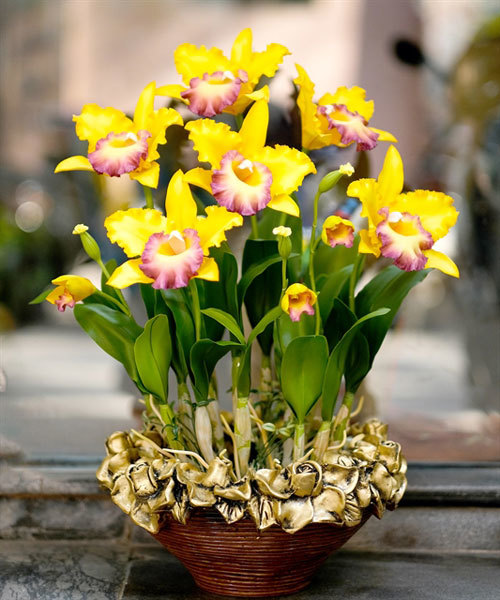 |
| OUT THEY GO: Her beautiful vases of queen orchids sell like hot cakes. Photo Hoa Dat Huong Thuy |
“This craftsmanship requires a lot of patience and fastidiousness. Since the kneading and colouring process makes it come to life, clay flowers require intensive research and months of colour mixing and testing to get the right shade. The rolling process also requires knowing the correct thickness for different types of petals. Colouring and drawing veins also require high-level techniques, plus there is oil paint on each and every petal, and overall it demands great precision.”
Her ingenious and deft skills have created many different types of orchids, as well as flowers typical of Vietnam, like lotus, phoenix flowers, and lagerstroemia (crepe myrtle) that come to life and bloom gloriously. Tiny details like flower creases, veins, and small dots are recreated on the clay.
In addition to clay flowers, Huong Thuy also researched and successfully created 3D clay flower paintings. She hired artists to draw paintings based on her request, then attached clay flowers, which resulted in incredible lifelike 3D paintings.
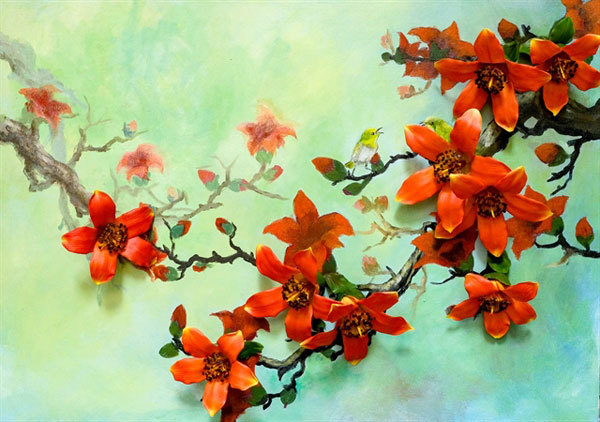 |
| DEPTH OF DESIGN: Huong Thuy’s silk-cotton 3D flower paintings won her second prize in a Hanoi handicraft contest. Photo Huong Thuy |
Beautiful roses that brighten up window frames when flickering in the yellow rays of the sun may make people feel as though they are standing in front of a window full of fresh and fragrant flowers. Or they may feel as though they could just reach out and pick a vibrant red phoenix flower on a branch in the summer sun.
Other works include beautiful sights of Hanoi, like lộc vừng flowers (itchytree) drooping down next to evergreen Hoan Kiem Lake or lotus flowers rising up from swamp water. The harmonious combination of her 3D flowers and scenery gives each work a unique aura, allowing art lovers to greatly enjoy a new form of art.
Artist Thuy was born in 1976 in Hanoi and graduated in journalism. She worked as a journalist for many years and always had a special love for nature and flowers.
In 2005, she stumbled across some clay flowers from overseas that looked a lot more lifelike than silk or paper flowers. She instantly fell in love with them and slowly learned the art form. By 2008, she had resolved to learn how to make clay flowers professionally.
“Back then, there was no clay flower professional in Hanoi, so I flew to HCM City in search of a mentor,” she remembered. “My kids were still young, so I couldn’t stay there for long. I only booked a few lessons, to learn the basic techniques and how to choose good materials to create a clay flower.”
After understanding the basic process and the steps in creating clay flowers, Thuy flew home and began testing and researching. She bought fresh flowers to study them more carefully. Her early flowers weren’t as delicate as they are now, but a lot of customers liked what they saw.
“When I look back, I know my vases weren’t really beautiful at all, but people bought them and they sold out,” she said. “It motivated me to try harder.”
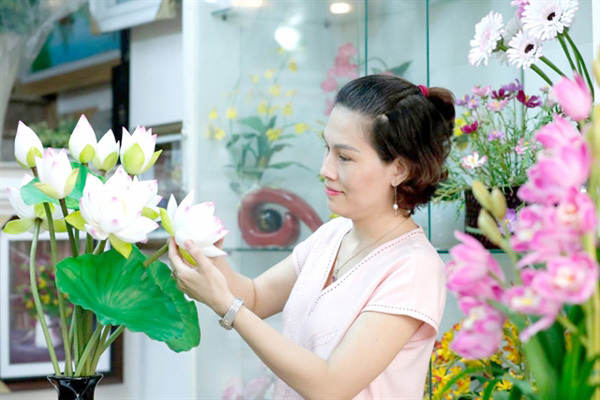 |
| CARE & ATTENTION: Huong Thuy looking after her clay flowers. Photo Huong Thuy |
After 15 years in the craft, she’s lost track of how many types of flowers she’s created. Symbolic flowers in Vietnam, like lotus and loc vung, were the hardest and most delicate to complete.
Some flowers she only made once and never again, because they were too intricate and time-consuming. Regardless, she constantly researches and creates new designs. Every time she comes upon a beautiful flower, she goes home, studies its shape and colour and then orders customised moulds to keep testing and mixing colours to recreate them.
“While some only take a few days to complete, others can take up to half a year before I’m satisfied,” she said.
One of the biggest challenges in making clay flowers is humidity and dust, which result in them becoming mouldy. To extend their longevity, Thuy did some research and tried different types of clay. She then researched a special type of paint to retain the colour and sheen. Now, her vases can retain their original colour for five or even ten years.
Her clay creations have received many awards in arts and crafts contests in Hanoi. In 2019, the city’s people’s committee awarded her the Hanoi’s skilled craftsperson title. And since last year, she’s been creating paper sunflowers, roses, chamomile, poppies, and others, that look equally beautiful.
“Paper flowers are easier to make than clay flowers, and the materials also cost much less, so more people can buy and enjoy beautiful flowers,” she said.
Nowadays, Thuy’s clay flowers have gained a cult following, with many customers at home and abroad buying them as gifts for family and friends or business partners, or for special occasions, while others buy them to decorate their own homes.
VNS
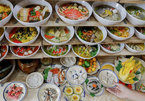
Unique Tet trays showcase national delicacies made from clay
Trays featuring food from the country’s three regions and various offerings for the Lunar New Year festival, known locally as Tet, have been vividly created using clay by an artisan in Ho Chi Minh City.
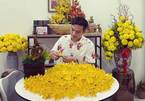
Ben Tre man makes peach flowers from wool
With nimble hands, Do Quang from Ben Tre province can turn long threads of wool into beautiful peach and apricot flowers. His handicrafts are very popular, even though the prices are as high as tens of millions of dong.